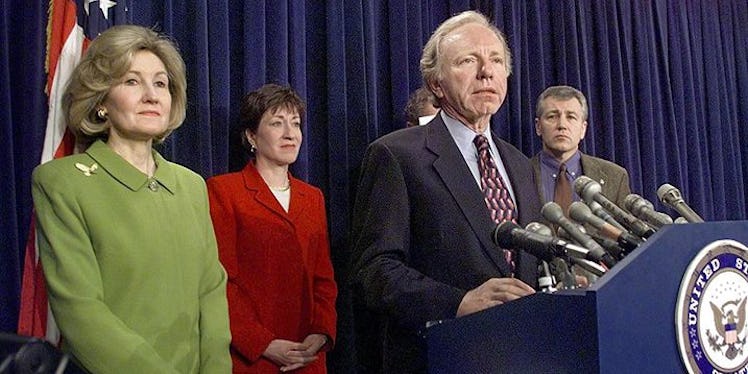If there's any question as to why the subject of how long it takes to impeach a president is relevant this week, you only need to take a look at the recent reporting from multiple outlets plugged into Washington D.C. On Wednesday, Sept. 20, the New York Times reported that Robert Mueller, the independent investigator in charge of the FBI's Russia investigation, has asked the White House for documents related to some of President Donald Trump's most notable actions this year, including the firing of former FBI Director James Comey. The Washington Post would later confirm the premise of the Times story, while citing a government official who ominously said,
I am convinced that no matter where they end up, this investigation will run to completion even if they fire Mueller. There is a feeling of inevitability now that we didn't have before — not of the outcome of the investigation but that there will be an outcome. There is no escaping this thing, whatever the conclusions.
UPDATE: On Tuesday, Sept. 24, 2019, Speaker of the House Nancy Pelosi announced that the House is opening an official impeachment inquiry into President Donald Trump over allegations that he pressured a foreign leader to investigate Vice President Joe Biden, Trump's political opponent. Pelosi said, "I'm directing our six committees to proceed with their investigations under that umbrella of impeachment inquiry." In a statement to Elite Daily, White House Press Secretary Stephanie Grisham said, "The Democrats continue to weaponize politics when they should be working on behalf of their constituents, which is nothing new. President Trump is working hard on behalf of our country here in New York City while they continue to scream the word impeachment. Nothing new here."
EARLIER: There were other stories, too, like the Daily Beast's reporting that Mueller has recruited the services of an attorney named James Quarles. Quarles' resume most notably features work related to the Watergate scandal, which led to the resignation of former President Richard Nixon, who himself would have faced impeachment had he not stepped down.
Put together, all of the reports mentioned above indicates to many that Donald Trump himself is now the subject of scrutiny within Mueller's investigation -- as opposed to just members of his campaign.
Should that investigation lead to a discovery of facts that points towards wrongdoing on the president's part -- or, more specifically, what Congress might deem obstruction of justice -- then the chances of impeachment will inevitable rise, especially if the control of Congress shifts hands after 2018's midterm elections.
How long would it take?
Only recent history could give some sort of idea of how long it would take for a president to get impeached. The impeachment of Andrew Johnson happened in the 1800s, when there wasn't -- you know -- modern technology and life moved a lot slower. As mentioned before, Richard Nixon resigned before the House could even vote on the articles of impeachment -- which would have likely led to his impeachment and removal.
Bill Clinton, on the other hand, is a president whose impeachment happened just under two decades ago. The process of Clinton's impeachment -- from the time the House of Representatives announced it would begin an impeachment inquiry in October 1998, to the moment former President Clinton was found not guilty in February 1999 during his trial before the Senate -- lasted about five months, with lots of important storylines happening in between.
For example, when the House voted to begin the process and prompted the House judiciary committee to draw up charges against President Clinton, 31 Democrats voted alongside Republicans at the time.
The number of Democrats voting with the Republicans was an important talking point, as would be the case for any Republican House members voting for the impeachment of a member of their own party. CNN's reporting at the time noted that members of the White House lobbied to lessen the amount of Democrats who voted for impeachment, even if impeachment was an inevitability. CNN notes that the White House did this because the fewer Democrats that voted to continue the process, the more it would look like a witch hunt by the president's opposition.
Then there was another landmark moment, in mid-November of the same year. Special prosecutor Ken Starr, who had been investigating Clinton's behavior prior, testified before the House judiciary committee and essentially told Congress Clinton tried to obstruct justice -- his direct words were "thwart the judicial process." Ten days later, actor Tom Hanks, a donor of Clinton's, publicly stated that he regretted giving money to the president's cause.
Eleven days into December, the House judiciary committee approved four articles of impeachment via which the president could be charged. A full week later, the whole of the House of Representatives voted on those articles and Clinton was officially impeached on two charges.
Between the time Clinton was impeached and the end of his trial, the then-president tried to negotiate with Republican senators, and the subject of whether he would resign was a constant talking point.
Eventually, Clinton was found not guilty and remained president, but not before five months' worth of national story kept providing more subplots.
The bottom line is that the prospect of impeachment promises a long process with a number of endless storylines in between. Even with the context of Clinton's impeachment, with a 24-hour news cycle and social media, there's no telling how it would look today.
